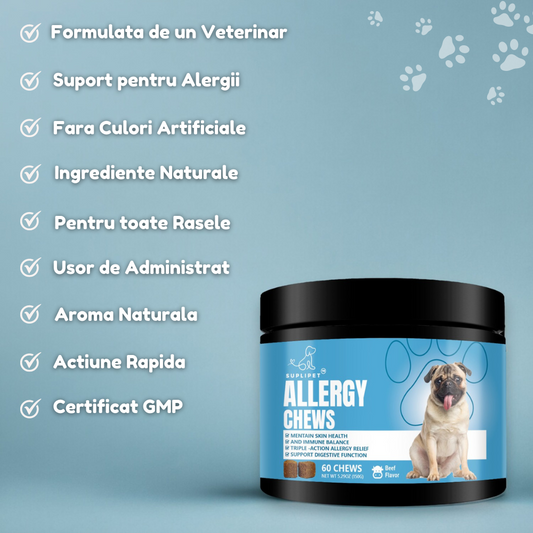Socialization is an important part of growing a well-behaved and happy dog. It involves introducing your dog to a range of people, animals, places, and experiences in a positive and regulated setting. Proper socialization prevents behavioral difficulties and ensures that your dog develops into a confident and sociable part of society. In this blog, we'll look at the necessity of socialization, the best ways to socialize your dog, and how to use supplements to help your dog's emotional well-being during the process.

Why Socialization is Crucial
- Prevents Behavioral Issues: Poorly socialized dogs may exhibit fear, aggressiveness, and anxiety. Socialization teaches canines how to interact effectively with other dogs and people, which reduces the likelihood of these difficulties.
- Promotes Confidence: Socialized canines are less apprehensive of new circumstances. This confidence enables individuals to easily handle changes and new experiences, making them more flexible.
- Improves Relationships: A sociable dog is easier to live with and appreciate. They are more likely to be sociable and calm around people and other pets, resulting in stronger relationships with their owners and other animals.
- Safety: Socialized dogs are less prone to become aggressive due to fear. This makes them safer to be around and lowers the likelihood of bites or other violent behavior.
- Enhances Mental Health: Providing a range of stimuli keeps your dog's mind alert and interested. This mental stimulation is beneficial to their overall well-being and can help reduce boredom-related behaviors like chewing and digging.
The Socialization Window
Puppy socialization is most effective between the ages of 3 and 14 weeks. During this stage, pups are more open to new experiences and more likely to form pleasant associations. However, socialization continues after this period. To maintain a dog's social skills and confidence, they must be exposed to various situations and places regularly.
Best practices for socializing your dog
- Start socializing your puppy as soon as you get them home. Early exposure to many people, animals, sounds, and settings lays the groundwork for a well-adjusted adult dog.
- Ensure positive socialization experiences. Treats, praise, and toys can help you form positive associations with new situations. Avoid putting your dog in circumstances that make them feel fearful or overwhelmed.
- Gradual Exposure: Introducing new experiences gradually. Begin with less intimidating settings and gradually increase the amount of exposure. For example, start with quiet locations and work your way up to busy places.
- Expose your dog to diverse situations, including parks, city streets, pet-friendly retailers, and public transit. The more diverse the surroundings, the more adaptable your dog will be.
- Encourage contact with diverse individuals, such as men, women, children, and those wearing caps or uniforms. This makes your dog more comfortable with a wide range of individuals.
- Schedule playdates with well-behaved, vaccinated dogs. This teaches your dog appropriate play behavior and fosters positive social skills with other dogs.
- Expose your dog to various sounds and surfaces (e.g., vacuum cleaners, thunderstorms, grass, gravel, hardwood floors). Gradual exposure to these cues helps to reduce fear and anxiety.
- Enroll in training classes for puppy socialization or basic obedience. These offer regulated situations where your dog can learn and practice social skills.
- Continue socializing with your dog throughout their life. Frequent exposure to new experiences helps them maintain their social abilities and avoid regression.

Recognize Stress and Anxiety
While socializing is crucial, it is also critical to identify when your dog is nervous or anxious. Signs of stress in dogs include:
- Shaking or trembling
- Excessive panting or drooling
- Pinched-back ears or tucked tail
- Excessive barking or whining
- Avoidance behavior (e.g., hiding or fleeing)
If your dog exhibits indications of tension, remove him from the situation and allow him to calm down. Gradually reintroduce the experience later, making sure it remains positive and stress-free.
Supplements to support socialization
Certain vitamins might benefit your dog's emotional health during the socializing process. These vitamins help reduce anxiety and provide a sense of calm, making socialization more enjoyable.
1. Green tea contains L-theanine, an amino acid that induces relaxation without sleepiness. It can help reduce anxiety and stress, making it simpler for your dog to deal with unfamiliar situations.
- Melatonin pills can lower anxiety and encourage better sleep. This can be useful for dogs who become agitated during socializing activities. Consult your veterinarian about the optimum dosage.
- Probiotics promote gut health and emotional well-being. Probiotics can assist in maintaining a healthy digestive tract and may reduce anxiety and stress in dogs.
- Valerian Root: A natural herb known for its relaxing properties. It can lower anxiety and encourage relaxation, making sociability more enjoyable for your dog.
- Chamomile is a natural herb with relaxing effects. It can assist in alleviating stress and anxiety by promoting calm during socialization activities.
We recommend you use supplements from www.suplipet.shop
Creating positive socialization experiences
Creating great socializing experiences is essential for raising a well-adjusted dog. Here are some ideas to make socialization a positive and fun experience for your dog:
1. Use high-value goodies like chicken or cheese to reward your dog for positive interactions. This promotes a strong favorable relationship with new experiences.
2. Keep socialization sessions brief and positive. Gradually increase the duration as your dog becomes more comfortable.
3. Maintain a calm and positive demeanor as your dog may sense your emotions. Maintain a calm and cheerful attitude throughout socializing sessions to make your dog feel more secure.
- Avoid exposing your dog to too many new situations at once. Gradual exposure is essential for preventing dread and anxiety.
- Monitor your dog's body language. If they show signs of stress or discomfort, take them out of the environment and allow them to rest.
- Maintain a constant routine to give your dog a sense of security. Regular meal times, walks, and play periods contribute to a stable environment.
Socialization of Adult Dogs
While early socialization is crucial, it's never too late to begin socializing an older dog. Here are some suggestions for socializing adult dogs:
1. Begin with low-stress circumstances, gradually introducing more challenging scenarios. Be patient and let your dog progress at their own speed.
2. Use positive reinforcement to reward positive conduct. High-value goodies and praise can assist in developing positive associations with new experiences.
3. If your dog has serious anxiety or behavioral concerns, consult a professional trainer or behaviorist. They can offer direction and assistance with socializing your dog.
- Use controlled surroundings, such as training classes or playdates with calm dogs, to boost your dog's confidence and social abilities.
- Consistency is crucial while socializing an adult dog. Regular exposure to new activities and surroundings boosts confidence while lowering anxiety.

The Role of Owners in Socialization
As a dog owner, you have a critical part in the socialization process. Here are some ways you may help your dog with socialization:
1. Socialization is a gradual process that demands persistence. Be patient with your dog and let them progress at their speed.
2. Maintain a cheerful attitude and foster a happy environment for your dog. Use positive reinforcement to encourage good conduct and form pleasant associations with new experiences.
3. Learn about dog behavior and body language. Understanding your dog's signs will allow you to respond appropriately and encourage their socialization.
- Establish realistic goals for your dog's socializing. Gradual progress is more vital than getting immediate results.
- Provide emotional support to your dog during socializing activities. Your presence and reassurance can alleviate worry and boost confidence.
Conclusion
Socialization is an essential part of rearing a well-adjusted, happy dog. You can avoid behavioral concerns and develop a confident and sociable canine companion by exposing your dog to a variety of people, animals, locations, and experiences in a positive and regulated setting. Patience, consistency, and positive reinforcement are essential for success while training a puppy or socializing an adult dog. Furthermore, certain vitamins might improve your dog's emotional well-being and make sociability more enjoyable. With good socialization, you can ensure that your dog is ready to face the world with confidence and joy.
-
Regular price$19.00Regular price
$24.00Sale price$19.00 Save $5.00 (20%)Unit priceperHip & Joint Chews 45kg+ Dogs
-
Regular price$23.00Regular priceSale price$23.00 Save $-23.00 (%)Unit priceper
Allergy Chews Dogs
-
Regular price$18.00Regular price
$23.00Sale price$18.00 Save $5.00 (21%)Unit priceperProbiotic Chews Dogs
-
Regular price$17.00Regular price
$21.00Sale price$17.00 Save $4.00 (19%)Unit priceperCalming Chews Dogs











